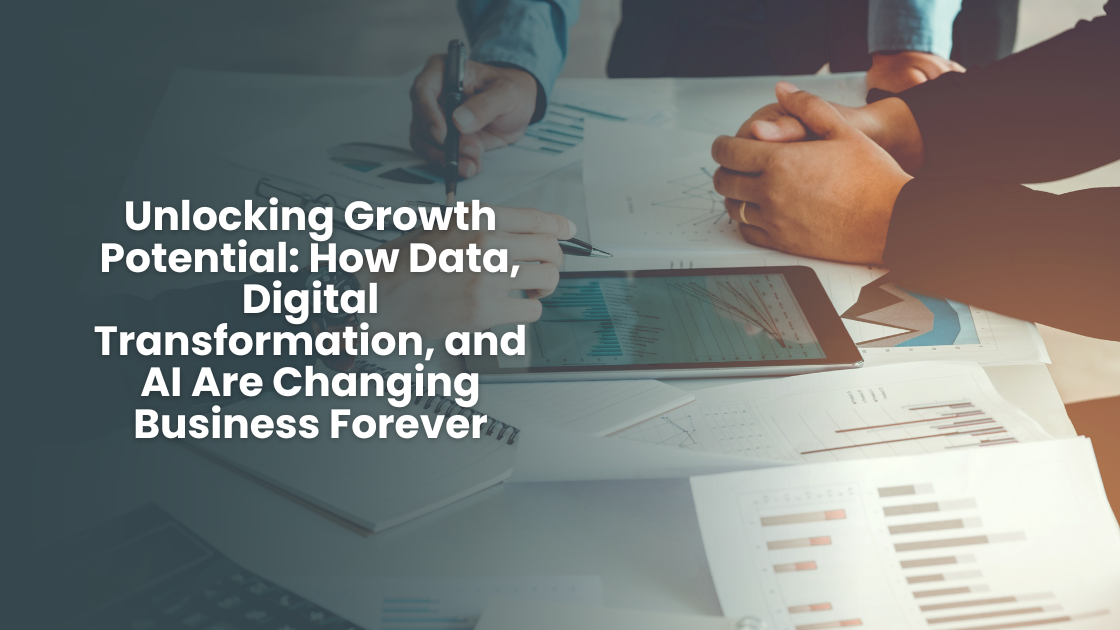For decades, business growth was fueled by capital, talent, and innovation. While these remain important, the new currency of growth is data. Organizations that can collect, analyze, and act on data are outpacing competitors and creating entirely new opportunities. Data is no longer just a byproduct of operations—it is a core strategic asset. When combined with digital transformation and artificial intelligence (AI), it becomes the foundation for exponential growth and long-term market leadership.
From Information to Intelligence
Raw data alone has little value; its power lies in how it is processed and applied. Businesses that master data analytics can uncover patterns, predict customer behavior, and make more informed decisions. This shift from intuition-driven to data-driven decision-making is one of the most profound changes in modern business. Leaders now have the ability to move beyond reactive strategies to proactive ones, anticipating opportunities and mitigating risks before they fully materialize.
The Role of Digital Transformation
Digital transformation is not just about adopting new technologies—it’s about reimagining how businesses operate, deliver value, and engage with customers. Companies that embrace transformation integrate digital tools across every function, from operations to marketing to customer service. This integration enables agility, scalability, and efficiency, allowing businesses to adapt quickly to market changes. More importantly, digital transformation makes it possible to turn data into actionable insights in real time, ensuring relevance in fast-moving industries.
Artificial Intelligence as a Growth Catalyst
AI is the force that takes digital transformation and data to the next level. By automating repetitive tasks, analyzing massive datasets, and learning from outcomes, AI enables organizations to operate smarter and faster. It enhances personalization in customer experiences, optimizes supply chains, and even drives product innovation. Far from being a futuristic concept, AI is already reshaping industries—from healthcare to finance to retail—by unlocking efficiencies and creating entirely new business models.
Personalization at Scale
One of the most visible benefits of AI and data-driven strategies is the ability to deliver personalization at scale. Today’s customers expect businesses to understand their preferences and anticipate their needs. AI makes this possible by analyzing behavior, predicting trends, and tailoring recommendations in real time. Companies that excel at personalization not only increase customer satisfaction but also build loyalty and long-term value. This creates a competitive edge that is difficult for less data-savvy competitors to replicate.
Driving Operational Excellence
Beyond customer experience, data and AI are transforming the way organizations operate internally. Predictive analytics can forecast demand, optimize inventory, and reduce waste. Automation eliminates bottlenecks and increases productivity. AI-powered tools enhance decision-making by providing leaders with accurate forecasts and scenario planning. Together, these advances allow businesses to scale efficiently without compromising quality. Operational excellence, once a differentiator, is fast becoming a baseline expectation in digitally transformed industries.
Empowering People Through Technology
A common misconception is that digital transformation and AI replace human roles. In reality, they empower people to focus on higher-value tasks by removing repetitive or manual work. Employees equipped with advanced tools can innovate, collaborate, and problem-solve more effectively. Leadership plays a critical role in ensuring that technology complements rather than replaces human capabilities. Companies that strike this balance foster a culture of empowerment, where people and machines work together to achieve more than either could alone.
Overcoming Challenges in Adoption
Despite the potential, embracing data, digital transformation, and AI is not without challenges. Organizations often struggle with legacy systems, data silos, and resistance to change. Successful transformation requires more than investment in technology—it demands a shift in mindset and culture. Leaders must champion digital adoption, provide ongoing training, and ensure that ethical and responsible practices are embedded in how data and AI are used. Those who can overcome these challenges unlock growth potential that far exceeds traditional models.
The Future of Business Growth
Looking ahead, businesses that embrace data, digital transformation, and AI will define the future of markets. Growth will no longer be measured solely by revenue or market share but by an organization’s ability to adapt, innovate, and remain relevant in a world of constant change. Companies that prioritize these elements today position themselves not just for short-term gains but for long-term leadership.
A New Era of Possibility
We are entering a new era where growth potential is no longer limited by traditional constraints. With data as the foundation, digital transformation as the enabler, and AI as the accelerator, businesses have unprecedented opportunities to innovate and expand. The organizations that thrive will be those that see these tools not as optional enhancements but as essential drivers of strategy. The future of business is not just digital—it is intelligent, adaptive, and boundless.
